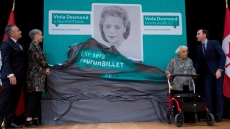OTTAWA — Canada is not required to provide a certain number of fighter jets to NATO, says a Defence Department report that's raising fresh questions about the Liberal government's rush to buy a new warplane.
The report, published in June 2014 by the research arm of National Defence, says that while Canada supports NATO and contributes aircraft and other military assets when possible, "there is no hard minimum requirement for the NATO commitment."
That means the only actual requirement Canada must meet in terms of providing fighter jets is its obligation to defend North America along with the U.S.
The government has repeatedly stated in recent months that the military does not have enough CF-18s to both defend North America and fulfil its obligations to NATO. It says that is why a new plane is needed sooner rather than later.
But neither the government nor the Defence Department have said how many jets Canada actually needs, saying that to reveal the numbers would jeopardize national security.
The comments have coincided with the Liberals backing away from their election promise to hold a competition to replace Canada's aging CF-18s. Critics have accused the Liberals of manufacturing a crisis to justify buying a new jet other than the F-35 stealth fighter without a competition.
While it's true NATO does not have a set minimum requirement for committing fighters, Canada nonetheless regularly commits a number of airframes to the alliance, said National Defence spokesman Daniel Le Bouthillier.
"This number can vary and is based on NATO defence planning targets that we strive to meet as strong, reliable members of the alliance," Le Bouthillier said in an email.
"Our priority is to ensure that the alliance remains modern, flexible and agile to face the threats of today and tomorrow."
During last month's NATO leaders' summit in Poland, Prime Minister Justin Trudeau said that in addition to taking leadership of a battle group in Latvia, Canada would send up to six CF-18s to Europe in the coming months to help patrol allied airspace.

The Defence Research and Development Canada report suggests that a maximum of 36 aircraft are required to be operational at any time to help defend North America, and that "anything beyond this number is in excess of the current requirement."
Those planes don't all have to be on high alert waiting for an attack, the report says. Some can be involved in training or NATO operations, and would be called back if required.
Canada currently has 77 CF-18s, but Defence Minister Harjit Sajjan has said only about half of them are operational at any given time. The report confirms those numbers, but also says the military can make do with 65 fighter jets.
Defence analyst David Perry of the Canadian Global Affairs Institute said the report may not shoot down the government's arguments for rushing to replace the CF-18s, "but it certainly points out the fact that a lot of this is very ill-defined."
"All of this makes it pretty hard to follow what the government is saying because they can't actually talk about the numbers, which are at the root of how they're defining this problem."
The Liberals promised during last year's election that they would hold an open competition to replace the CF-18s. But they also promised not to buy the F-35, creating a potential legal situation should the government be seen to be discriminating against the stealth fighter.
The U.S. air force declared this week that the F-35A, the version the previous Conservative government had planned to buy, was ready for combat.
Postmedia reported in June that the government was considering whether to use an exemption in federal procurement laws to buy Boeing Super Hornets as an "interim" measure to address the capability gap. That would let it sole-source the planes without fear of a lawsuit.
While the government insists no decision has been made, it says replacements are needed fast and has refused to commit to a competition. It launched consultations with industry last month to determine a path forward, and an announcement is expected in the fall.




